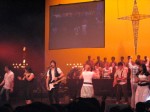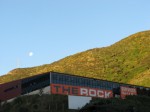 Sunday, December 16 2007. At 5 pm, Arise Church presents its “Christmas Production” at the Opera House on Manners Street, in Wellington Central. The room is full, mothers with young children have been installed on the balcony and the stalls are mainly occupied by young Pakeha (New Zealander from European descent), with some Pacific People too. The service is arranged as a kind of concert-show: a set of rock music, Christmas songs and choreographies, before the young Senior Pastor John Cameron jumps on stage for a short (30 minutes) but energetic sermon. To make it short, Jesus Christ is bringing us the light to save us from darkness and this is the only gift which lasts longer than a Christmas night. Even if consumption doesn’t provide the “long-lasting peace” of the conversion, there was a happy winner some minutes before in the room, when John Cameron invited the public to look under their seats for a small coloured sticker, to win…a Mp3!
Sunday, December 16 2007. At 5 pm, Arise Church presents its “Christmas Production” at the Opera House on Manners Street, in Wellington Central. The room is full, mothers with young children have been installed on the balcony and the stalls are mainly occupied by young Pakeha (New Zealander from European descent), with some Pacific People too. The service is arranged as a kind of concert-show: a set of rock music, Christmas songs and choreographies, before the young Senior Pastor John Cameron jumps on stage for a short (30 minutes) but energetic sermon. To make it short, Jesus Christ is bringing us the light to save us from darkness and this is the only gift which lasts longer than a Christmas night. Even if consumption doesn’t provide the “long-lasting peace” of the conversion, there was a happy winner some minutes before in the room, when John Cameron invited the public to look under their seats for a small coloured sticker, to win…a Mp3!
But the first purpose of this event is to win new converts, with an insistent call to those who want to step forward and “give their heart to Jesus”. Launched in November 2002, Arise Church is one of the Evangelical Churches with no denominational label who strive to attract the New Zealand young generation to a Christianity apparently relieved of its constraining, institutional and “old fashion” components. Its services usually take place at the Paramount Theatre on Courtenay Place, one of the favourite places of Wellington nightlife.
It’s also here, in the Wellington Central district, that the Greens, the New Zealand ecologists, gained their highest scores in the 2002 and 2005 elections (around 16 per cent). Despite friendly relations with some progressive Christians (like the left wing of the Methodist Church), the Greens are for many Evangelicals the symbol of the secularisation of the New Zealand society. They notably gave raise to the last mobilisation of the Evangelical networks with a Bill adopted in 2007 by the Parliament and called by its opponents the “Anti-Smacking Bill”, forbidding corporal punishment of children: a law seen as an “anti-family” law by the Christian Right who is now trying to get enough signatures on its petition to organise a referendum.
Wellington Central has also, according to the 2001 Census, the highest rate of graduated people (with 36 per cent of its population aged over 15 having a University degree, 3 times bigger than the national average) and the highest rate of 20-30 years old (26,7 per cent) (1). So maybe not the good profile if you want to fill an Evangelical church…
 And yet, there are several Evangelical Churches encountering a real success there, adapting their expression (music and service’s style), their message and their organisation to youth’s expectations. Some of them have kept their classic denominational label, like the Elim Church (one of the oldest Pentecostal denominations, established in the beginning of the 20th century in Great-Britain). But many are “no label” Churches, a strategy also chosen by some youth missionary organisations – Youth for Christ for example has been renamed Incedo in New Zealand – to distance themselves from institutional Christianity. Equippers, a branch of the Apostolic (Pentecostal) Church of Great-Britain, is one of the latest launched in Wellington and holds its services in Wellington Central and in Porirua, a suburb where many Pacific People live.
And yet, there are several Evangelical Churches encountering a real success there, adapting their expression (music and service’s style), their message and their organisation to youth’s expectations. Some of them have kept their classic denominational label, like the Elim Church (one of the oldest Pentecostal denominations, established in the beginning of the 20th century in Great-Britain). But many are “no label” Churches, a strategy also chosen by some youth missionary organisations – Youth for Christ for example has been renamed Incedo in New Zealand – to distance themselves from institutional Christianity. Equippers, a branch of the Apostolic (Pentecostal) Church of Great-Britain, is one of the latest launched in Wellington and holds its services in Wellington Central and in Porirua, a suburb where many Pacific People live.
Another no label Church: Sunday, November 25, close to Courtenay Place, a service at the Street. No insistent call to conversion here, the services mostly strive to make people (both Church members and newcomers) feel comfortable and even the rock music band doesn’t attack eardrums. Evangelisation is relational: this Sunday, a man comes on stage to explain how he took the opportunity of a fishing trip to get in touch with two persons in his neighbourhood. They haven’t talked about religion yet, but certainly time will come… It would be difficult to find a softer approach. The functioning of the Church itself is more relational than institutional. A disinstitu- tionalisation process, related to the evolution of the New Zealand society? Not only. The Street is not a new Church created to catch the mood: it is in fact one of the oldest Evangelical Churches in Wellington, stemming from the Open Brethren movement. Its story gets back to 1913, when the Vivian Street Assembly decided to turn to the inner-city deprived families, a mission work which gave birth to a Church ten years after and got its own building in 1928. In the 50s, the Church moved to Elisabeth Street, at the bottom of Mount Victoria. Its official name was then the Elisabeth Street Church, but it was more simply called the “E Street”. In 2002, the growth of the Church led it to move to Hania Street, the E disappeared and the Church finally kept only the name of “The Street”.
time will come… It would be difficult to find a softer approach. The functioning of the Church itself is more relational than institutional. A disinstitu- tionalisation process, related to the evolution of the New Zealand society? Not only. The Street is not a new Church created to catch the mood: it is in fact one of the oldest Evangelical Churches in Wellington, stemming from the Open Brethren movement. Its story gets back to 1913, when the Vivian Street Assembly decided to turn to the inner-city deprived families, a mission work which gave birth to a Church ten years after and got its own building in 1928. In the 50s, the Church moved to Elisabeth Street, at the bottom of Mount Victoria. Its official name was then the Elisabeth Street Church, but it was more simply called the “E Street”. In 2002, the growth of the Church led it to move to Hania Street, the E disappeared and the Church finally kept only the name of “The Street”.
 In the valley leading to Johnsonville and Porirua, North of Wellington, the Rock church is one of the more trendy Churches of the area. Evangelical and Charismatic, this Church took its name (besides the implicit biblical reference) from the place where it was established, in a former quarry. It could also indicate the style of music that can be heard there. Its functioning is relatively close to The Street’s organisation, with a pastoral team (please don’t call them by their titles but by their first names), Life Groups, youth groups, training sessions and an evangelisation that is mainly relational, at the risk of tightening its social sphere of influence to one milieu – the Pakeha middle classes. The founder of the Church, Anthony Walton (coming from the New Zealand Pentecostal movement of New Life Churches) is also a former leader of Future New Zealand, a political party allied with the Centrists of United New Zealand until 2007 (he was also the Deputy leader of the alliance, called United Future) when they broke up after a disagreement on the “Anti-Smacking Bill”. The Rock is also supporting Blue Print, a new youth Church based in a café in Wellington Central, which presents itself as “a Church for the un-churched, a movement for the lost and disenfranchised”.
In the valley leading to Johnsonville and Porirua, North of Wellington, the Rock church is one of the more trendy Churches of the area. Evangelical and Charismatic, this Church took its name (besides the implicit biblical reference) from the place where it was established, in a former quarry. It could also indicate the style of music that can be heard there. Its functioning is relatively close to The Street’s organisation, with a pastoral team (please don’t call them by their titles but by their first names), Life Groups, youth groups, training sessions and an evangelisation that is mainly relational, at the risk of tightening its social sphere of influence to one milieu – the Pakeha middle classes. The founder of the Church, Anthony Walton (coming from the New Zealand Pentecostal movement of New Life Churches) is also a former leader of Future New Zealand, a political party allied with the Centrists of United New Zealand until 2007 (he was also the Deputy leader of the alliance, called United Future) when they broke up after a disagreement on the “Anti-Smacking Bill”. The Rock is also supporting Blue Print, a new youth Church based in a café in Wellington Central, which presents itself as “a Church for the un-churched, a movement for the lost and disenfranchised”.
1. Raymond Miller (ed.), New Zealand government and politics, 4th edition, Oxford University Press, 2006:395-96.
Photos: Y. Fer et G. Malogne-Fer ©